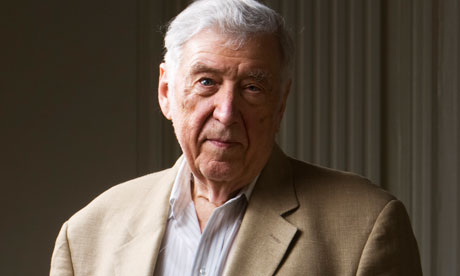I spoke with Gunther Schuller for the first time last November around the occasion of his 85th birthday. I’d played some of his music to mark that milestone, and was delighted to answer the home phone a few days later and hear his voice saying “Bravo!” As it happened, I was hurriedly trying to get out the door when suddenly I found myself in a conversation that touched on an amazing number of subjects in no time. Still, I had to go, so we agreed to talk again soon, and shortly thereafter decided to hold a follow-up conversation in person at the Community Music of Springfield. (Our initial meeting date was November 2, but in the wake of Halloween weekend’s storm and widespread power outages, it’s been rescheduled to December 7.)
Despite my limited personal contact with Gunther, he’s felt like an avuncular figure in my life for many years. Around 1970, the Boston Phoenix ran a cover story on Schuller, who was then President of the New England Conservatory of Music. Duke Ellington’s name was mentioned in a pull quote from the story, and that drew me in to reading of this man who had a substantial background in classical music but was also a champion of jazz. Schuller described figures like Ellington and Louis Armstrong as the equivalents of the European masters, and the news that occasioned the Phoenix article was the inauguration of a jazz curriculum at NEC. That alone made Gunther a gutsy guy, for while jazz progresses toward a comparable status with classical music on college campuses and at institutions like Lincoln Center, it was a rarity 40 years ago.
Well before his NEC tenure, Schuller had co-founded the Jazz and Classical Music Society with John Lewis of the Modern Jazz Quartet, and in collaboration with Lewis, Jimmy Giuffre and others, he began forging a new idiom that drew on elements of both. Schuller coined the term Third Stream to describe his musical vision, and he was a guiding force behind a formal presentation of the new music in a concert held at Brandeis University in 1957. Among the works premiered at Brandeis were Charles Mingus’s “Revelations” and George Russell’s “All About Rosie,’ the latter highlighted by one of Bill Evans’s earliest attention-getting performances.
Miles Davis was a featured soloist at the Brandeis concert on new works by John Lewis and J.J. Johnson, and that furthered a connection between Miles and Gunther that had begun in 1950 when Schuller played French horn on the last of the trumpeter’s Birth of the Cool sessions. Gunther’s association with Mingus also carried on through the years, and recently he conducted the Mingus Orchestra on Labor Day weekend at the Tanglewood Jazz Festival.
Schuller has juggled these and an extraordinary number of other assignments over his long life. He’s been honored as an NEA Jazz Master, a Pulitzer Prize-winning composer, and was the recipient of a MacArthur “genius” grant in 1991. Along the way, he’s managed to write two essential works of jazz history, Early Jazz and The Swing Era. And the University of Rochester Press has just published his memoir, Gunther Schuller: A Life In Search of Music and Beauty. Read the Wall Street Journal’s review here.
A few years ago, Gunther composed and orchestrated “The Birth of the Cool Suite,” an extended work that interweaves three pieces from the Davis classic, “Moon Dreams,” “Move,” and “Boplicity.” Joe Lovano recorded it for his Blue Note release Streams of Expression. Here’s a short documentary showing Schuller and Lovano at work.
Be sure to join us on December 7 for Words & Music with Gunther Schuller. We’ll have plenty to talk about.
